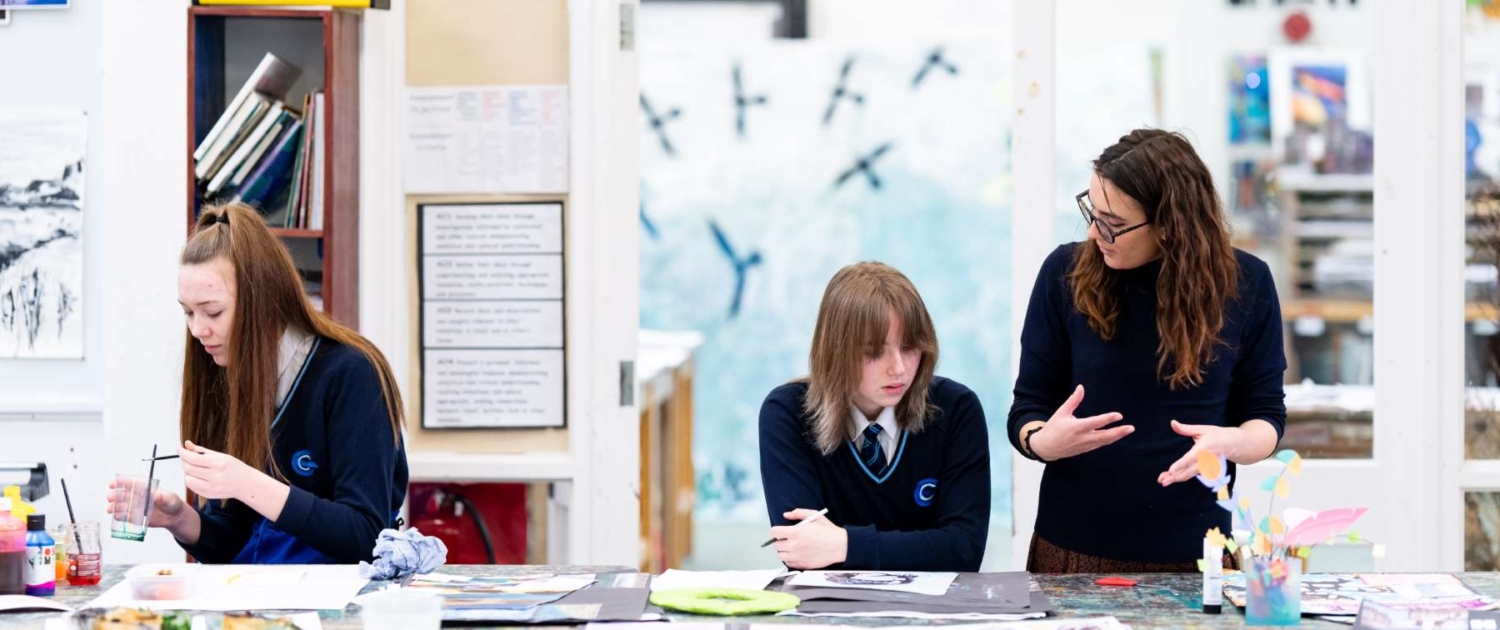Art
“If you hear a voice within you say ‘you cannot paint’, then be all means paint and that voice will be silenced”
Vincent Van Gogh
The Cape School Curriculum ensures that all our students have the opportunity for academic and personal development across a broad range of subjects and experiences. It combines equality of opportunity to our core learning with opportunities for students to make individual choices regarding their learning experiences. Acquisition of knowledge and transferable skills are the cornerstones of our student’s progress and we place a high value on building their understanding of community, place and social justice. Lessons and other learning experiences are sequenced to build on students’ prior knowledge, and to ensure that students deepen their understanding of each subject, and the interconnection between subjects and their global context.
Our Curriculum is the foundation to achieving our Core Principles:
- Students leave Cape with high value achievements and the life skills and resilience that provide a platform for future success and happiness.
- We are inspired to work together to research, design and implement highly effective and sustainable solutions to develop and maintain our thriving school community.
- Continuous improvement is achieved through a whole school culture of, and commitment to, creativity, engagement and professionalism.
What is Unique to the study of Art?
Every child is an artist and through our Curriculum we provide opportunity and encouragement for all students to strive for excellence and build their artistic skills. The Curriculum offers the flexibility to support the skills and interest of all students, whatever their ability. This is achieved through a structured programme of activities, which promote the learning of technique whilst nurturing confidence, individuality and creativity.
The Curriculum provides a rich and varied experience of Art linked to local, national, international, modern and classic art. It will develop knowledge of skills and techniques and of genres and artists. Students experience a learning environment, in which they are challenged to think, evaluate and make informed judgements and to come to conclusions about their work, developing resilience, confidence and the commitment to further improve, giving them a powerful set of life skills for the future.
In each Year group, students are taught to understand and appreciate the work of other artists, craft persons and designers. The work studied acts as a stimulus in the development of their own ideas. Students learn the skills and techniques necessary for the creation of their own works of art and develop this through the use of sketchbooks.
For each project, we place emphasis on the formal elements of Art and Design i.e. line, tone, perspective, colour theory, composition and form. Most projects start with the production of observational drawings and then develop into other areas so that students begin to understand the use of mixed media within their work. Students have the opportunity to record responses to direct experience, memory and imagination of natural/man made worlds. We encourage students’ independent study, investigation, research and personal initiative.
Our innovative Art department is well equipped and produces work of outstanding quality in a range of media.
We also provide opportunities for first-hand experience of original work through visits to galleries as well as visiting artists who work with the students sharing their own practice. We encourage KS3 pupils to join Creative Arts clubs, through Be Inspired, as well as other clubs on offer/ gallery visits & workshops.
During the summer term, we hold an annual Creative Arts evening celebrating the success of every one of our students.
Our Curriculum equips students to continue their study of Art into Higher Education with the many different career routes and opportunities that this subject can offer.
Repeat Concepts in Art
The repeat concepts underpinning learning are:
- Inspiration and Research- Learning about and responding to artists
- Drawing and Recording- Our understanding of the formal elements underpins everything we record. Line/Tone/Texture/Colour/Shape/Form/Space
- Exploring materials, techniques and processes
- Developing ideas review and refine.
- Producing an outcome/personal response


Kites
Art
Science
Global Values
PE & Sport
Music
Mathematics
History
Geography
French
Food & Nutrition
English
Design & Technology
Drama
Computer Science
Art